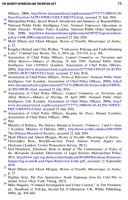FYI re his co-author:
Tim Parsons: As its former Head of Equality, Diversity and Human Rights with the rank of Chief Inspector, Parsons once occupied a similar position at the City of London Police as Inspector Bob Lambert had at the Metropolitan Police's Muslim Contact Unit. In 2006 Parsons published a Guide To Islam For Non-Muslims[117], authored by Mehmood Naqshbandi, an IT consultant with private sector company Logica.[118] Whilst the book does not mention Lambert by name, it does praise his Muslim Contact Unit as having created “a bi-directional, trusted relationship between the Metropolitan Police and members of the Muslim community who have concerns about the way that conventional policing frequently misinterprets aspects of the Muslim community.” Lambert reciprocated with fulsome praise for the Guide in a press release issued by City Of London Police, which in turn was cited by several newspapers and other news media.[119][120][121]
Following his retirement from the police in August 2010, Parsons - like Lambert - pursued an academic path, having already secured a Master's in Education from Hull University in 2001, and begun work on his Doctorate at King's College London in 2003. On leaving the City of London force he joined the John Grieve Centre at London Metropolitan University as a Senior Lecturer in Criminology, whilst continuing his studies at KCL, which he completed in 2011.[28][29][28][30] By his own account, Parsons has extensive experience “of teaching and lecturing in [by 2013] 20 different countries across Europe, N. America, Africa and the Middle East,” at higher education institutions including the London School of Economics, the University of Surrey, the University of Westminster, Exeter University and the Woodrow Wilson Centre in the United States. “In addition to this he has taught in a number of different global organisations and police training academies including those in London, Toronto, Warsaw, Budapest, Zagreb, Kiev, Sarajevo, Kigale (Rwanda) and Abu Dhabi.”[33]
Parsons, in his capacity as an academic at LMU, publicly endorsed Lambert's positive view of Muslim Brotherhood-linked organisations such as the Muslim Association of Britain, noting that he could “personally testify to the value of the advice and guidance provided to the police by the MAB”.[122] From at least October 2011 until at least June 2013 Parsons was a member of the advisory board to Lambert's and Githens-Mazer's European Muslim Research Centre at the University of Exeter. Fellow board members during his time there included Anas Altikriti (Cordoba Foundation, Muslim Association of Britain), Muhammad Abdul Bari (Muslim Council of Britain, Islamic Forum of Europe), and American academic John Esposito.[28] Parsons is also a member of the advisory board of American think tank Research Institute for Human Security and Cooperation,[123] where Lambert protegé and (at least until October 2015) still-serving Muslim Contact Unit officer Detective Constable Abid Raja[124][125][126][127] has a Fellowship.[128]
In September 2012 Lambert - having in October 2011 quietly resigned his post at the University of Exeter[21] - joined Parsons at the John Grieve Centre in London Metropolitan University.[31][32][33][30] Lambert would also appear alongside Naqshbandi at a 2015 conference hosted by London university the School of Oriental and African Studies.[129][130]
In January 2015, with a public campaign to have Lambert removed from his teaching post at London Metropolitan University building support, Parsons in his capacity as Senior Criminology Lecturer at LMU appeared on a television news programme to defend the decision to hire Lambert in the first place. He indicated that he had been the one to suggest that Lambert apply for the poist in the first place, and described him as “an extremely distinguished academic” with “extremely rich experience in professional practice, even accepting some of that is controversial.”[131] Lambert's resignation from London Met was publicly acknowledged in December 2015, as was his leaving St. Andrews University.[132] Parsons is thanked by Lambert and Jonathan Githens-Mazer in their London Case Study produced through the European Muslim Research Centre.[16]






 ) because arson is never a very safe activity .
) because arson is never a very safe activity .































